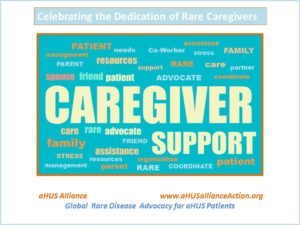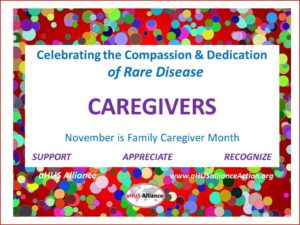
Some countries use the term ‘carer’, while other nations prefer the word ‘caregiver’ to describe those individuals who fill the vital role of offering assistance to people living with specialized physical, mental or development needs. For rare disease patients and their families, the people who provide care and support can make a real and very positive difference across varied areas of life. A rare disease diagnosis affects not only the patient and their family but also impacts all individuals and groups associated with the patient as well. Complexities abound and may include: obtaining the diagnosis of serious or chronic illness, difficulty finding information about a rare disease, and financial as well as lifestyle issues.
Many caregivers are family members, filling a vital but unpaid role to assist, coordinate and support a child or an adult needing extra levels of care. Whether newly diagnosed or coping with life challenges years later, some common issues and concerns arise for rare disease patients and those who care for them. While stress about finances, relationships, and responsibilities can weigh heavily on all concerned, it’s important to recognize that such needs and concerns arise and/or change without pattern.
Various caregiver resources and tools are available, and are meant to both enlighten and to aid those close to the heart of rare disease patient care. Since patient needs vary among age groups and may change rapidly as their health status fluctuates, caregivers may benefit from revisiting local and online resources on a regular basis. Rare caregiving is often around the clock and without holiday, so achieving health and life balance is vital for all involved.
For rare disease patients, the road is often long and challenging. Managing medical as well as social aspects may impact family dynamics, personal relationships, professional or work/school aspects, and other interactions across all areas of everyday life. Support can mean different things, to different people, at different times. Caregiver needs and challenges change dynamically, and often in direct relation to circumstances in centered on the patient’s health and lifestyle needs. Supporting caregivers and providing them with resources has the ability to enrich and give aid within an expanded circle, creating a positive ripple effect across many levels of patient and family life. We honor and recognize the vital role of rare disease caregivers with these basic tenents: Reflect. Consider. Network. Refresh. Ask. Offer. Learn. Support.
A Few Resources for Caregivers
Caregiver Action Network: Caring for Rare Disease Caregivers. Family Caregiver Toolbox
Carers UK: Help & Advice
Global Genes: Caregiver Resources
National Alliance for Caregiving: Resource List
The Atypical HUS Foundation, Video: Rare Disease Challenges: Support for Patients & Families
Rare Disease United: Caregivers Advocacy and Support, Resource Links
Rare Diseases – Various Links, General Info
Check Orphan – Information & Rare Disease News
CORD – Canadian Organization for Rare Disorders
EURORDIS – Rare Disease Europe http://www.eurordis.org/
NORD – National Organization for Rare Disorders USA
RareConnect – Connecting Rare Disease Patients Globally, Patient Communities
Articles – Read & Learn More
A Guide to Taking Care of Yourself (Family Caregiver Alliance)
Tips for Taking Care of Yourself (Mayo Clinic)
How to Help a Friend or Loved One Suffering from a Chronic Illness (American Psychological Association) Also available in Spanish
Living with a Chronic Illness – Dealing with Feelings (NIH Library of Medicine) Also available in Spanish
Caring for a Seriously Ill Child (Kids Health by Nemours Foundation)
Siblings of Children with Chronic Illnesses (American Academy of Pediatrics)
Students With Chronic Illnesses: Guidance for Families, Schools, and Students (NIH article)
Balancing Academics and Serious Illness, For Parents (Nemours Foundation)
The Impact of Rare Disease on Family Caregivers (Everyday Health)


